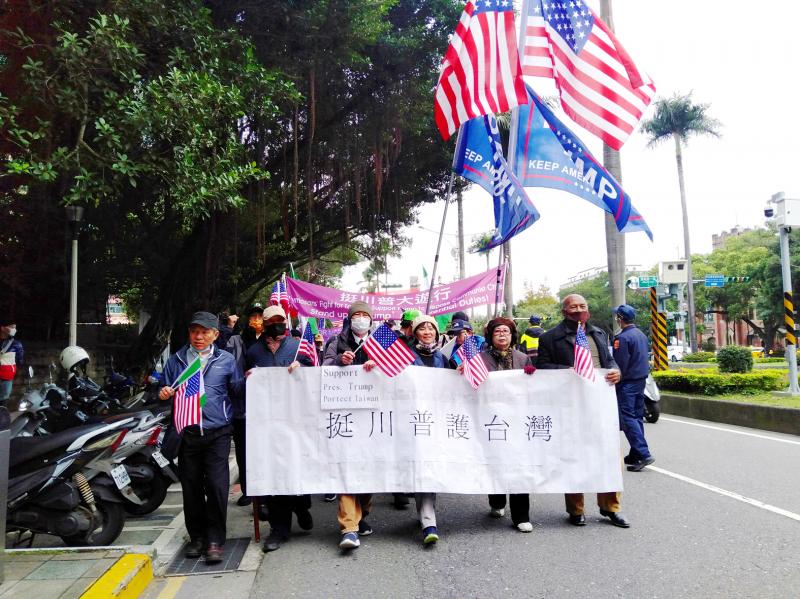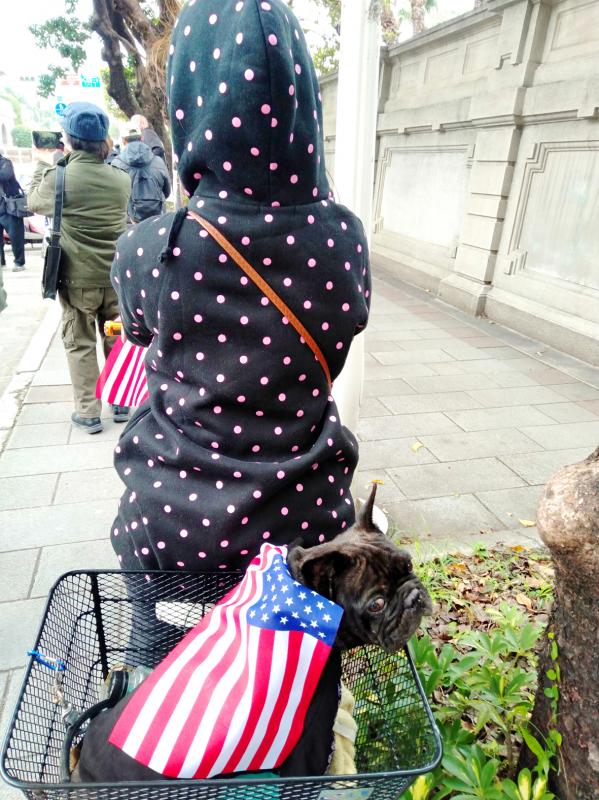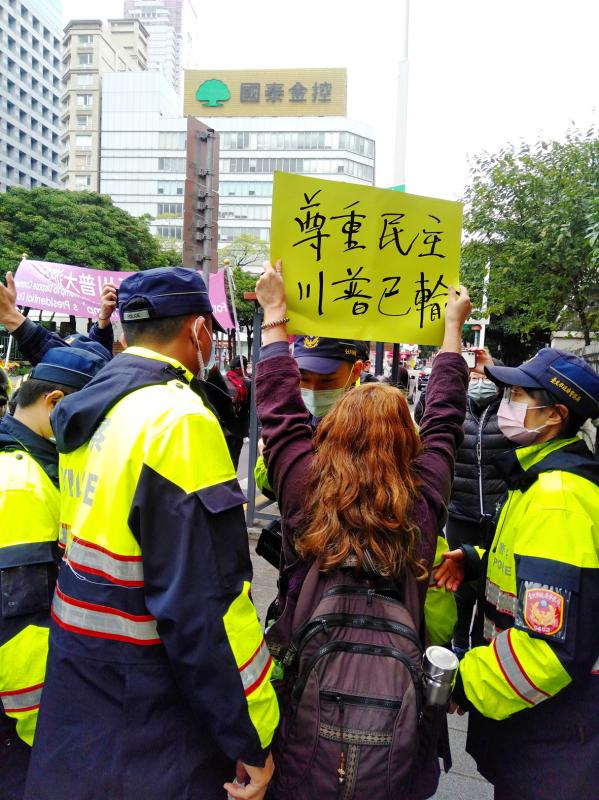Things get off to strange start as the gathering on Ketagalan Boulevard takes shape from 1:30pm on Saturday. A gathering of pro-Taiwan independence groups and activists marching in support of outgoing US President Donald Trump seems odd enough. But the wild-eyed fellow who accosts me before the banners are even unfurled is next-level weirdness.
Balding, with a long, greasy wisp of hair straggling from below his cartoon-character-emblazoned face mask, he conveys a sense of urgency as he approaches.
“Americans — it’s your fault!” he declares.

Photo: James Baron
This is not what I expected, and — despite his manic manner — he recognizes my confusion.
“Where are you from?” he asks, lowering his mask.
“England.”

Photo: James Baron
“Ohhhh, England! The same thing! The virus was spread by you … England, America and Communist China,” he shouts. “And,” he adds after a couple of seconds’ reflection, “the Japanese! Bastards (壞蛋), the lot of you!”
“I’m a bastard?” I object, with a semi-rhetorical question.
“Oh, not you, but your governments,” he concedes. “They started this virus, didn’t they?”

Photo: James Baron
Before I can answer, he stalks off muttering, and I suddenly realize that he has nothing to do with the rally. “Ignore him,” a middle-aged female participant advises. “He’s nuts.”
This is just the beginning. For the next hour-plus, a series of memorable interactions — some amusing, some rather disturbing and most downright baffling — ensues.
The demonstration has been organized by a coalition of groups whose views and approaches toward Taiwanese nationhood overlap and diverge; what unites them today is a belief that Trump is Taiwan’s best bet.
Some want to keep their ideals separate from the rally’s stated purposes of showing support for Trump and to inviting him to visit Taiwan.
“I don’t want to talk about Taiwanese sovereignty here,” says Tsai Pai-chuan (蔡百銓), a historian with over 50 books to his name. “Of course, I support independence but that makes people nervous,” he says. “I’m just here to show my gratitude to Trump.”
I ask why Trump deserves Taiwan’s appreciation. “He’s the only one who supported us. He wants to cut China down to size. He sold Taiwan weapons.”
Would Joe Biden be bad for Taiwan? “Oh definitely. He takes Communist money. And look at his son — he’s sick! He slept with his dead brother’s wife!”
Following instructions about the format of the various chants that will punctuate the procession, we embark, turning the corner at the gates of Taipei Guesthouse. It’s a fitting starting point: in 1952, the Treaty of Taipei was signed here by Japan and the Republic of China (ROC) government, officially bringing an end to the Second Sino-Japanese War. As with related Treaty of San Francisco signed the year before, the ambiguities of the accord are cited by independence groups as evidence of Taiwan’s unresolved status. While some argue that the lack of clarity means that Taiwan should be a protectorate of the US, others posit continued — albeit literally tenuous — links to Japan.
One of the co-organizers of the event, the Preparatory Office of Autonomous Formosa Detached Territory of Japan (PAJF), bases its claims partially on a colonial era submarine cable connecting the Philippines to Taiwan. The argument appears to be that Japan’s claim to the remainder of the cable establishes some kind of link to the territory the cable connects to.
And, right on cue, to muddy the waters further, as we head down Gongyuan Road, a young man hurries to my side. “Sir, Sir!” he calls. “Can I explain to you the Taiwan problem?” It seems I have no choice. “This is the problem of colonial and the region [sic],” he says, beginning a largely incomprehensible exposition, which posits the ROC as an occupying power (a common theme among the rally’s participants). Kevin Chang (張庭瑋), an international relations major, seems bright enough but rather confused and unable to form his half-decent vocabulary into coherent sentences.
As we reach the corner, opposite the old National Taiwan University Hospital building, Chang veers off on a tangent, expressing his admiration for Turkish President Recep Tayyip Erdogan. I tell him there are Turks in Taiwan trapped in limbo and subject to threats because of Erdogan’s repression. Surprisingly, Chang knows this; but before he can broach the “problem” of these Gulenist refugees, I scarper to rejoin the procession. As I leave, he presents his card. “Little Putin” is his Instagram name.
Outside the National Health Insurance Bureau, a fracas is developing. A masked Westerner wearing a purple changshan jacket and sunglasses brandishes a small yellow placard with Chinese characters on it. One side translates as “Respect democracy, Trump already lost.” The reverse reads “Incompetent Trump killed his countrymen.”
The woman is quickly surrounded by police who tell her she cannot follow the procession. It is, they insist, against the law. “Where can I walk?” she asks in faultless Mandarin. “If I don’t carry the sign is it OK?” Suddenly an elderly man clutching a USA flag in his left hand attempts to grab the woman’s sign with his right. Rubberneckers snap away excitedly at the periphery of the corral.
Eventually, the police escort the woman across the road to the corner of 228 Peace Memorial Park. She introduces herself as Stefani Pfeiffer. I immediately recognize the name from mutual Facebook friends.
“These people think they’re going to get Taiwan independence by supporting Trump,” she says. “They don’t understand what kind of man he is. They oppose the legal, fair outcome of the American election.”
Looking disdainfully in the direction of the rally, she says “I teach people how to write science papers using evidence and logic, and it drives me crazy that people believe in these conspiracy theories.”
The loop back to the starting point is relatively uneventful. Peter Ku (古文發), a representative of the Taiwan Independence Party introduces himself, thanking me for my “support,” and a journalist friend points out some of the better-known figures in the crowd. He stresses that, contrary to Pfeiffer’s implication, not everyone here believes the election was rigged. This jars with my observations.
Back at Ketagalan, a series of chants and speeches ends proceedings. The main address is by Michael Yeun (楊明昊), a Taiwanese-American dentist who has recently returned to celebrate his father’s 98th birthday. Following his speech, an open invitation for Trump to visit Taiwan, the softly spoken Yeun tells me there was “clear evidence” the election was rigged. Standing next to him, Chilly Chen (陳峻涵), director of the Taiwan Republic Office agrees, calling the election “fake” and referring to Biden’s “dirty money.”
Tsai Pai-chuan also cries foul. “They were counting dead people’s votes,” he says. “It’s the same as the [Chinese Nationalist Party (KMT)] in Taiwan.”
I tell Yeun — who recalls having a vertebra broken by police during Taiwan democracy protests in New York in the 1980s — that some people have difficulty reconciling the activist roots of the groups attending this rally with Trump’s distinctly undemocratic behavior.
“That’s a misconception, due to mainstream media, which is all controlled by the left, and deep state,” he says, citing the far-right, Falun Gong-affiliated Epoch Times as the only completely trustworthy news outlet these days. “That’s his personal style,” he says of Trump. “I don’t judge people on these small things, but on what they do. And right now, he is doing the best for America and, so, for Taiwan.”

In the March 9 edition of the Taipei Times a piece by Ninon Godefroy ran with the headine “The quiet, gentle rhythm of Taiwan.” It started with the line “Taiwan is a small, humble place. There is no Eiffel Tower, no pyramids — no singular attraction that draws the world’s attention.” I laughed out loud at that. This was out of no disrespect for the author or the piece, which made some interesting analogies and good points about how both Din Tai Fung’s and Taiwan Semiconductor Manufacturing Co’s (TSMC, 台積電) meticulous attention to detail and quality are not quite up to

April 21 to April 27 Hsieh Er’s (謝娥) political fortunes were rising fast after she got out of jail and joined the Chinese Nationalist Party (KMT) in December 1945. Not only did she hold key positions in various committees, she was elected the only woman on the Taipei City Council and headed to Nanjing in 1946 as the sole Taiwanese female representative to the National Constituent Assembly. With the support of first lady Soong May-ling (宋美齡), she started the Taipei Women’s Association and Taiwan Provincial Women’s Association, where she

Chinese Nationalist Party (KMT) Chairman Eric Chu (朱立倫) hatched a bold plan to charge forward and seize the initiative when he held a protest in front of the Taipei City Prosecutors’ Office. Though risky, because illegal, its success would help tackle at least six problems facing both himself and the KMT. What he did not see coming was Taipei Mayor Chiang Wan-an (將萬安) tripping him up out of the gate. In spite of Chu being the most consequential and successful KMT chairman since the early 2010s — arguably saving the party from financial ruin and restoring its electoral viability —

It is one of the more remarkable facts of Taiwan history that it was never occupied or claimed by any of the numerous kingdoms of southern China — Han or otherwise — that lay just across the water from it. None of their brilliant ministers ever discovered that Taiwan was a “core interest” of the state whose annexation was “inevitable.” As Paul Kua notes in an excellent monograph laying out how the Portuguese gave Taiwan the name “Formosa,” the first Europeans to express an interest in occupying Taiwan were the Spanish. Tonio Andrade in his seminal work, How Taiwan Became Chinese,